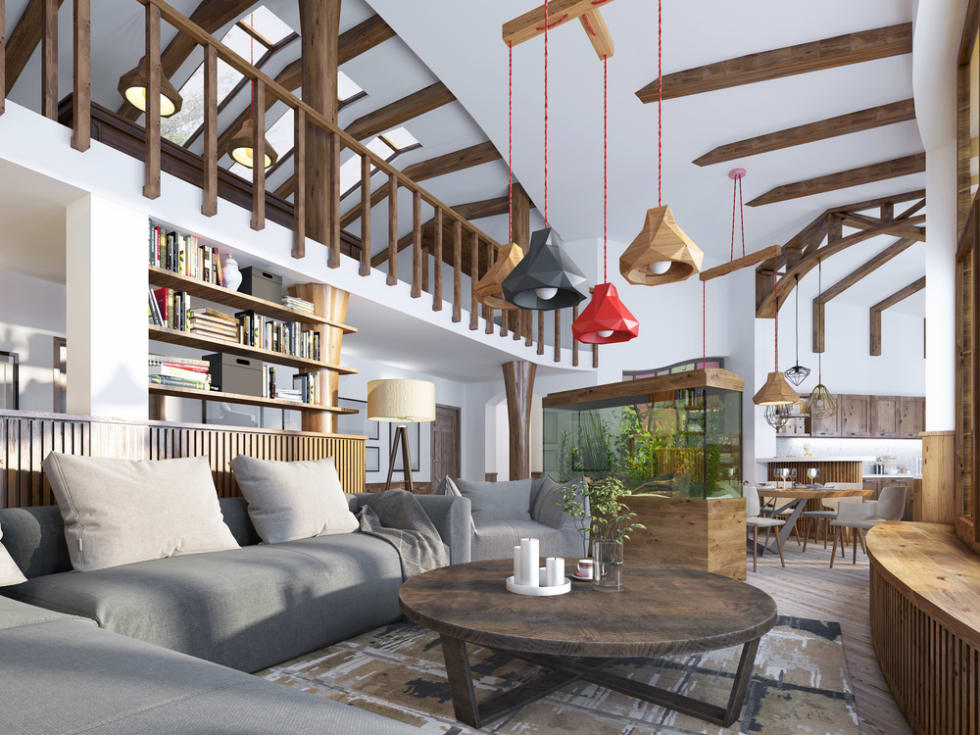Maisonette Apartments: An Overview + How to Find Them

If you're looking for upscale living as a renter, there are more options than penthouses and upscale complexes. Instead, you can take inspiration from maisonette apartments, which translates to "little house" in French. These apartments combine the best elements of townhouses and lofts, offering tons of perks for renters.
Ready to find one for yourself? Learn more about these luxury apartments, how to find them, and what to expect from annuities to budget. Here's where to get started. Bonjour!

What is a Maisonette Apartment?
Maisonette apartments are popular in metropolitan luxury markets like New York City and could be lofts or duplexes. Maisonettes usually include more than one floor, although there are exceptions to the rule.
Beyond their private entrances, maisonettes are also part of a larger unit or apartment complex. These ground-floor apartments have private, street-level entrances, though they are different from basement or garden apartments.
Pros of Renting a Maisonette Apartment
Maisonette apartments conjure up images of elegant, Parisian living. Here are a few of the practical pros to renting one for yourself.
Open Floor Plan
Maisonette apartments usually have open floor plans that resemble a loft or a two-story duplex. As a result, you're likely to find high ceilings, lofted bedrooms, and an open space not restricted by barriers and closed-off rooms.
More Space
Apartments are frequently cozy and follow a floor plan of living space, kitchen, bedroom, and bathroom. Unfortunately, there's not much open space to create more fluidity or design the aesthetic you want.
If you live with a roommate, you can also spread out and choose rooms on different floors. You still have the benefits of urban living, but your apartment feels more like a townhome than a standard apartment.
More Privacy
Maisonettes enjoy private entrances directly from the street, offering more privacy for renters. You don't need to go through the lobby or shared staircase and deal with neighbors after a long day.
Potential Outdoor Space
Maisonettes are similar to townhouses with two or three-story structures that often include outdoor space, though not all maisonettes have outdoor space. However, you're more likely to find a patio, small yard, or shared courtyard than with a traditional apartment complex.

Cons of Renting a Maisonette Apartment
Now that you know all the major perks of renting a maisonette apartment, let’s look at some of the downsides.
Higher Utility Bills
Maisonette's open space and high ceilings also come with higher utility bills. You'll likely pay higher heating and cooling bills unless you live in a mild, year-round climate.
If you're not sure how to plan, learn more about the average utility costs in an apartment. You can also get proactive about your utility bills by weatherproofing your windows, using draft guards under your doors, and piling more blankets on your bed. The less you can rely on your heat and AC, the more you'll save.
Potential Noise Issues
It's common for voices and other noise to carry through open spaces. However, there are solutions. Creating barriers with furniture, plants, and privacy screens can help redirect or absorb the noise.
Usually More Expensive
Maisonettes are highly desirable and often larger than other apartments on the market, which means their rents come at a higher price tag. But, of course, if you have a few roommates or can find an apartment in a less trendy neighborhood, you're more likely to find an affordable option that works for you.
Lack of Parking
Some cities lack parking, regardless of the apartment type (hello, New York City!) However, other areas may provide dedicating street parking or covered options for tenants. Yet maisonettes are often found in dense, urban areas or above shops and pubs.
While you’ll still have a dedicated, private entrance, parking can be severely limited or non-existent.
How Much are Maisonette Apartments?
Maisonette apartment rents vary depending on the city and neighborhood you live in. For example, they'll prove far more expensive in Boston and New York City than in a market like Cincinnati. However, they will likely be pricier than traditional apartments in their market.

What's the Best Time to Find a Maisonette Apartment?
Fortunately, you can lower your costs when renting a maisonette apartment with the right strategy in place. The best time of year to rent an apartment is usually during the winter months, as you'll likely find cheaper rents and less competition.
There's also a seasonality in apartment renting that impacts pricing. The spring and summer months are usually the most competitive times to rent, especially when college students are moving into off-campus housing.
Landlords usually rent out apartments starting at the beginning of the month. However, there are always unexpected vacancies when a renter suddenly breaks their lease or faces eviction. Keep an eye out for rental advertisements throughout the month.
How to Find a Maisonette Apartment?
Ready to find a maisonette apartment for yourself? Here's where to start apartment hunting.
Determine Your Budget
Your budget will determine what type of apartment you can rent and what neighborhood you can live in. However, being able to pay for a maisonette apartment and comfortably affording one are two different things. We recommend calculating your rental budget with the 30% rule. This method stipulates you only spend 30% of your gross income or less on pre-taxed monthly take-home pay.
There's a quick and easy way to follow the 30% income rule. Just divide your gross annual salary by 40. So if your income is $60,000 a year, divide it by 40. So now you know you should only spend $1,500 or less on rent per month.
If you can't find a maisonette apartment for $1,500, don't worry. You may consider teaming up with a roommate or significant other. Starting a side hustle to strengthen your spending power can help you comfortably afford the apartment you're looking for.
Understand the Trust Cost of Renting
The 30% rule is an excellent base for figuring out how to live comfortably. However, there's more to your monthly expenses than just rent. You also need to scrutinize the look at some of the hidden apartment expenses that occur regularly. Here are some of the everyday hidden apartment expenses to plan for:
- Apartment application fees
- Moving costs
- Move-in fees
- Security deposit
- Pet deposit
Now think about your other fixed expenses. For example, suppose your financial circumstances include student loan debt or medical expenses. In that case, the 30% rule may not be a good fit for you. However, if you have no debt obligations, roommates, and extra income, you may be able to spend more.
If you need a hand detangling your financial puzzle, our Rent Calculator can help determine your extra expenses and how much you can comfortably pay. We built this tool with renters in mind, helping them to find an ideal situation, no matter where they’re moving.
Set Your Apartment Priorities
Cities like New York boast numerous housing options, including maisonettes and brownstones. Once you figure out your finances, you should move on to your apartment priorities and what matters the most to you.
Amenities
Start by making a list of your needs, wants, and wish lists in your maisonette with the essential items at the top. You'll quickly identify which amenities and perks are deal-breakers and which ones you can live without. You may want to live near public transportation, pubs, or bike storage.
Location and Neighborhood
The location and neighborhood you live in can also be an essential part of your work-life balance. You may not mind living on the city's outskirts in your maisonette apartment. Or, you may decide you need to spend more to live near the action and convenience of the city.
It's a good idea to do a test run and see how long it takes you to get to work and your favorite music venues around your city. For example, you may decide commuting an hour just to meet friends at your favorite bar isn't practical. Or you may feel indifferent about the added time and resources and just enjoy living in your ideal apartment at a comfortable price point.
Consider Your Commute Time
Your commute time from your apartment is essential for choosing where to live. On the other hand, a long commute may work well if you enjoy reading on the bus or subway. It's also good to check your area's walk and bike scores. You may find biking takes less time than other forms of transportation and open up more possibilities of where to live next.
Prepare for Apartment Tours
It's essential to take a tour before signing a lease for your new maisonette apartment. However, these types of apartments are highly desirable and require making a quick decision. Bring your government-issued ID, a landlord or work reference, proof of income, bank statements, and your application fee. Ask about the payment preference ahead of time, although most property managers accept cash, credit card, or check.
It's also wise to brush up on how the application process works before scheduling your next apartment tour. Then, you'll come into the experience more confident and ready to decide while knowing what to expect.
Despite the need to make a quick decision, you shouldn't feel rushed. Take your time soaking in all of the details of the apartment and make sure the listing matches the amenities. Check to see if everything is working correctly and as described.
When you're caught up in your apartment tour, it's normal to forget what to ask the property manager or landlord. Come armed with our list of 20 questions to ask when renting an apartment, and stay focused and proactive about your rental experience.

Applying for Your Maisonette Apartment
After taking an apartment tour and asking all of your questions, it's time to submit an application and documentation. The application process should go smoothly, especially if you come prepared and feel confident after the tour. Your application may require additional materials, including rental references.
Landlords prefer references from other landlords or property managers. However, it's normal for first-time renters to lack all of the documentation they need. Ask your manager, superior, or someone who supervises your volunteer work to draft a reference for you. They can speak to your reliability and character.
You should also reach out to your rental references and let them know they may receive a call from a landlord. It helps speed up the application process and gives everyone time to prepare.
Protect Yourself from Rental Scams
Rental scams are one more thing to consider before hunting for your next maisonette apartment, as they are all too common, no matter how careful you are about staying proactive. According to a rental fraud report by Apartment List, 37.8% of renters encountered an apartment listing they suspected was fraudulent. In markets like Denver, 8.9% of renters lost money from at least one of their rental scams. Protect yourself and stay aware by following these tips for avoiding rental scams to keep yourself protected.
Using Apartment List to Find Your Maisonette Apartment
While apartment hunting requires attention and caution, it should also be fun! The Apartment List team wants the rental experience to be as stress-free as possible. That's why we created a quiz with a few simple questions. We take your responses and help match you to apartments based on your specified criteria.
Next, we'll mix and compare your results to make it as easy as possible to find the apartment you want based on amenities, location, and price.
Final Thoughts
Living in a maisonette apartment offers the upscale, urban living you're looking for without compromising on space and amenities. Get started on your apartment hunt by signing up with Apartment List.
Maisonette Apartments FAQs
Is a maisonette better than a flat?
Maisonette apartments oftentimes provide more privacy compared to flats. Their private entrances and outdoor stairwells make coming and going incredibly convenient for renters.
What is the difference between a flat and maisonette?
Maisonette apartments offer renters a living space typically spanning two floors with private entrances and stairwells, whereas flats feature a single floor with each room level with the next.
What is the difference between a maisonette and duplex?
Maisonettes are sometimes referred to as "duplexes" becuase of the term's recent popularity. The properties offer the same feautres, however people often use "duplex" to describe a property with a more modern design.
What is the difference between a maisonette and a townhouse?
Townhouses occupy an entire sturcture or proerty and are generally considered single-family residences. A maisonette apartment, on the other hand, only takes up a portion of a multi-unit residence that's situated on the ground floor of the building.
Share this Article



